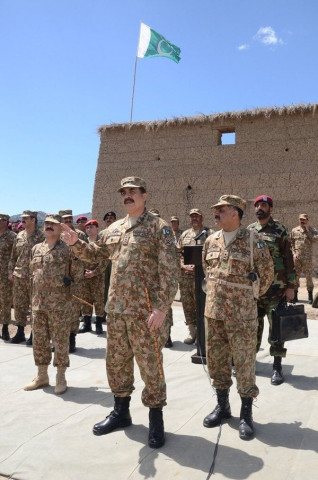The fight against terrorism
Pakistan is fighting a long war, and as of the last week has won a battle in that war — but it is far from over

Army chief General Raheel Sharif in Shawal on April 18, 2016. PHOTO: ISPR

Whilst the announcement is welcome, the COAS was careful to append a caveat. Once again, the army has done the job it was asked to do and done it well, but Part two of the operation is in civilian hands, albeit with military assistance, and it is the resettlement of those temporarily displaced by the fighting (TDP) and that is a major task. Many have lost their homes and livelihoods, their flocks and the small bazaars they conducted daily life in. There has been considerable damage to the already threadbare infrastructure, which is going to need replacement and not just repair on the most urgent basis. The COAS also called for the “breaking of the nexus” between the terrorists and their facilitators which sit outside the tribal areas, and let it not be forgotten that there were anyway facilitators within the local population before the operation started, and it is unlikely that their sympathies will have swung 180 degrees in the period they have spent in displacement.
It is the failure to run a parallel operation to de-radicalise displaced persons that is the soft underbelly, the vulnerability that ultimately may determine the success or otherwise of Operation Zarb-e-Azb overall, and not only in the fastnesses of the Shawal valley. This was a job for the civilians and on the current evidence it is unfinished business — which may prove to be a costly error.
Published in The Express Tribune, April 20th, 2016.
Like Opinion & Editorial on Facebook, follow @ETOpEd on Twitter to receive all updates on all our daily pieces.















COMMENTS
Comments are moderated and generally will be posted if they are on-topic and not abusive.
For more information, please see our Comments FAQ